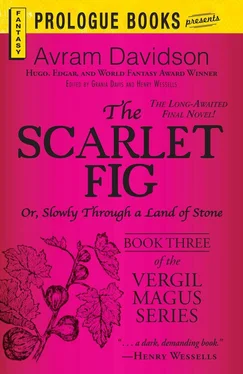And, “Gems? Gold? Gem comes not in abundantly, but it comes and I take of it. Perfect stones, only: nothing flawed. Gold? The people of this land and of the lands behind and past the lands behind, though fairly steadily they come to sell me gold, they never come to buy it. They have their own sources, far away far, I see … others may see it too, I suppose … but so far ….” She didn’t finish the sentence.
“And elephant?” he had asked. Such a look fled swiftly along her face. “Five-limbed Uluvendas, though long he lives, though long he lives, does not live forever.” Why not buy and sell the obviously very old elephant? — “Uluvendas?” he asked. — “Five-limbed Uluvendas,” she answered.
For a moment he paused; then, “The oliphaunt!” he exclaimed. She did not at once reply, but he saw that he was correct. (Later, when he had the time to consult the Olden Books, he realized that according to the Law of Letters, as laid down by the Punes, who had invented letters, from uluvend to oliphaunt was no great change: and that the original word had passed from the Hethits of northern Asia Minore to the Greeks of western Asia Minore: the very thought of there having been oliphaunts in that continent struck him with great force as a most antic notion: yet there it was: and was it any more antic than the fact that there had not alone been lionels in Asia Minore but lionels in Greece as well? and yet now behold: in Africa, whence always something new, today: oliphaunts and lionels alike … and cockodrills as well: and in India: lionels, oliphaunts and cockodrills. It beseemed him, then, that there was even more of a unitas in the universe than ever he had thought before.)
She went on, “So some have asked, Why not sell the obviously very old elephant? surely you must know the dying place, that race thereof, and might have it gathered and sell it, no fear that your precious ones have been slaughtered for their teeth? — but he may have been so slain,” she said, “by those who thought to sell the teeth long time later … But I do not allow Five-limbed Uluvendas to be slain on my shores and slopes, nor into the Interior … as far as my word may reach … and it reaches far … far away far. But — always — always — there are those who wish to slay Uluvendas; for his flesh, yes, but they don’t come from far away far to murder him for his flesh alone: for his teeth, his teeth of elephant, they come to murder him from far away far.” The certain look, such as came into her face when she spoke of Five-limbed Uluvendas, lingered long, but even long must leave after even length of time.
And a voice, as though echoing, if not from a thousand caverns forth, yet echoing, echoing, he could not remember whence, nor from whom, nor whose the voice; She does not allow the teeth … teeth … teeth …
And was if for this reason that she, Huldah, desired to remain there, there, in the Region called Huldah ? whence, though by many parted ways, one reached, eventually, the long road to the Pass of Gold ?
Likely he would never know.
Towards the port, all along he walked, in the entering of the day, he felt himself accompanied by someone, a someone who kept out of sight A light-limbed, and a body light of weight.
It was Huldah for sure.
But which Huldah he did not know.
Sea monsters lay rotting on the beach in shoals , where had he read that? in The Strabo, perhaps. It seemed as true now as ever. At some sound of distress, as Vergil muffled up his face (not his whole face, only that part of it below the bridge of his nose: the lower face, which the Masked Men called the thag — a part of the body which had no name among all the other people of the world), the helmsman said, “Yea, they do stink intensely bad, but I rather smell they on the beach, and they dead, than fear they, saunce smell, in the water, and they alive.”
“From what cause are they dead, helmsman?”
“That I dunno, Messer, ‘t’s a rare sight, but un sees it now and then — by Here and Merc!” and he pushed hard at the helm.
Vergil heard, or perhaps only felt, the ship shiver as it nudged a shoal; it hung for a moment, then swung loose and free. Said the seaman, “There did not use to be so many shallows … and sometimes you gets into a false channel which it’s so choked with weeds and hardly you may go through … navigation, now, that’s harder than it was, ‘longside these shores … ‘less we goes out so deep, to deep, deep sea. We do fear the deeps, and we fear the Punic sea-fleets more.”
“They say it was the Punes who first invented navigation —”
“They say. And some of them wants, beseemingly, to keep a monopole upon it.”
Vergil gave a soft sigh, and said no more. Much had he heard this voyage on the subject: Carthage had relinquished this and that: Carthage had been destroyed: and even so and even now, some New Carthage savagely still harried and pursued ships of other provenance if this could be done outside the explicit area of the Empery. And … sometimes even if it could not.
And Vergil, remembering that rage which he had seen upon that Punic face in Tingitana (and what had become of that sad, sick, hopelessly hopeful man who was called “Jugurthas VI, Titular King of Tingitana”? whom Vergil had so long ago encountered? — he did not know, and though it would be an aggrandizement of the fact to say he did not care, it would not be much of one), Vergil, recollecting what he considered the holy rage of the man who was, after all, not merely One Hemdibal, a merchant and a shroff: a Pune, but actually … or actually called … Josaias, King of Carthage ! wherever Carthage now actually was: Vergil could hardly wonder that the shipmen, mere maggots though the Carthagans might consider them, shivered as they spoke of it.
… much loved by Juno, ancient Carthage, stained with purple, and heavy with gold …
It would take indeed much purple, worth its weight in gold though it was, and much, much gold, for any newer Carthage to attempt once again, after three resounding defeats and one sky-shattering destruction, to contend with Rome.
Which by no means guaranteed that this could not be once again assayed.

The ship sailed on, onward sailed the ship, sometimes it did not sail, but then see the seamen up and out with their oars; on they went. They went on. One day they raised an island he, by cert, had never seen before: out of the faint pink flushes of dawn that streaked the sky whose stars were well-nigh pallid where they lingered still at all, an island raised itself watch by watch out of the sea; mountains for surely he could discern. And at least one thin line of smoke anent the shore, so one for sure blower of fire there must be upon or by that shore, whether almost he bent himself into the fire to blow with his naked breath or whether merely he leaned over to it and blowed with a hollow tube which might be any length. Watch by watch and a half, the island showed itself to be two islands. The blue outlines became green. Mountains on the one island still half-hidden in a mist, crags upon the other island and their outlines clearer by each straining stroke of oar. And a most, then, curious thing: the line of smoke stopped, then it began again, then it was estopped again, and then at last it rose and rose upon the sleepy air.
Vergil asked aloud the question traditional to be asked of passenger to pilot, much as What thing? was asked of pilot unto pilot, were they near enough for that; Vergil asked, as he had asked a muckle times before, “ What coast? What shore of people? ” The pilot moved to speak to him, and turned a bit his head; the pilot turned his head again, and to him did not speak. But someone else did speak, as near as the curl of hair above his ear-hole.
Читать дальше












